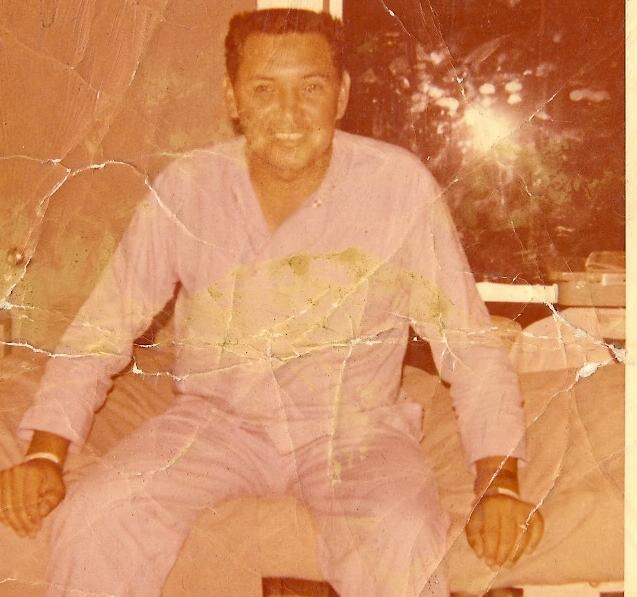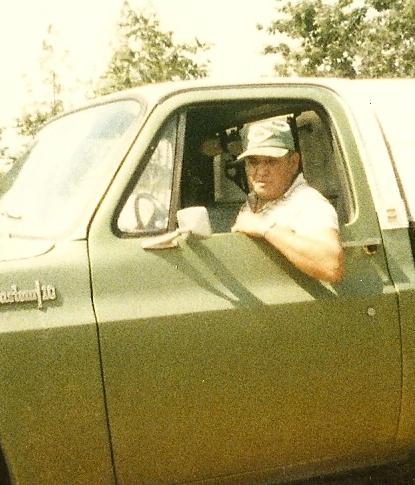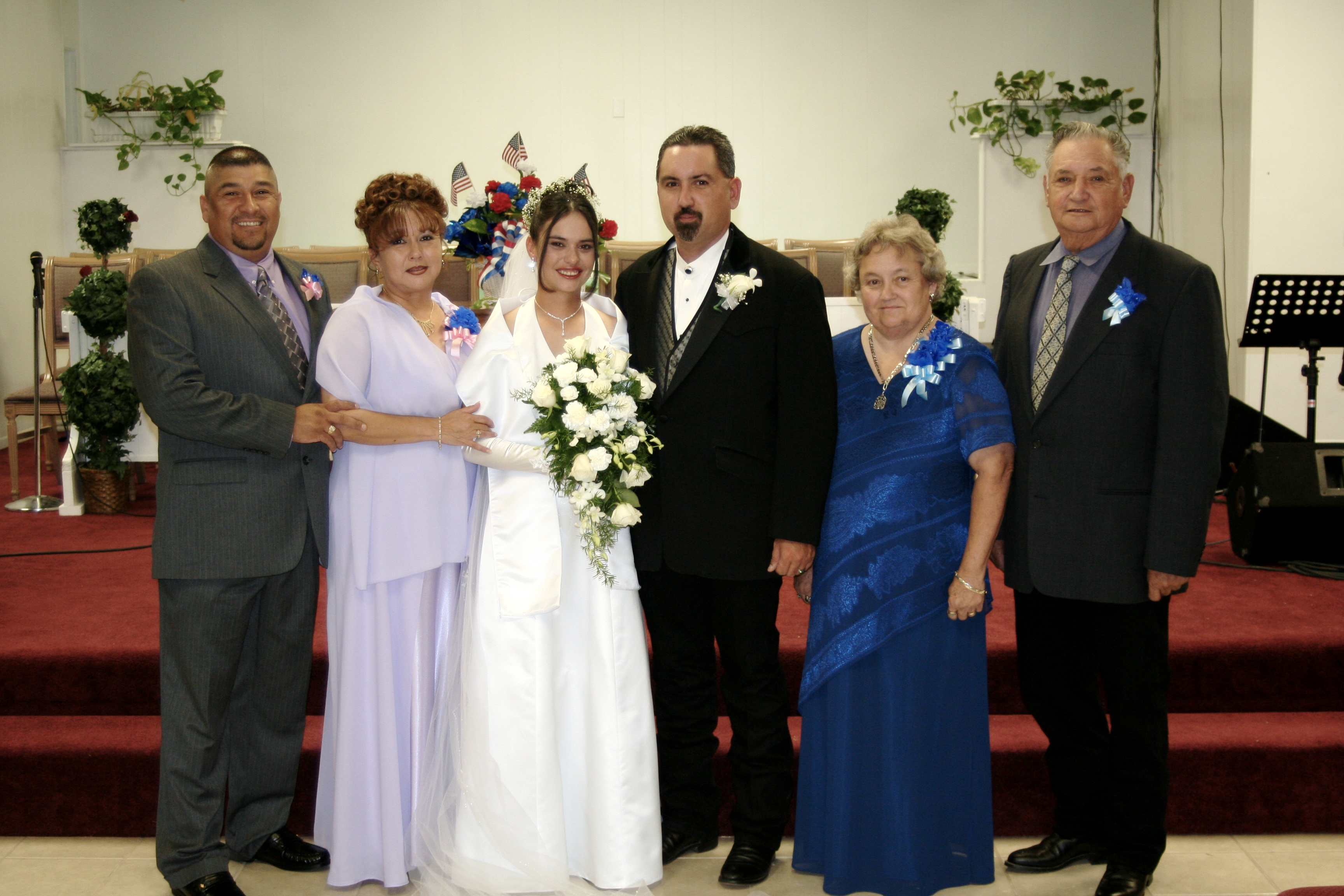TRANSCRIPTION
Why did you join the Air Force?
Well, uh, really I planned to go to college and at the time financial difficulties were involved and I was gonna go to college on a baseball scholarship and I got injured. Hurt my leg and at that time we still had a military obligation to take care of. So I decided rather than get drafted I would just join the Air Force. So that's what I did.
Where did you do your Basic Training at?
Lackland Air Force Base
What was Basic Training like for you? Was it rough?
No. Really for me since I was real active in sports and all, uh it was kinda a snap for me. The physical part of it and instruction part of it was uh, nothing I mean it was just a breeze through.

What was your primary MOS (Military Occupational Skill)?
Really I was supposed to go into radio communication and all this. They had us set up to go to tech school and they cancelled the tech school for the whole flight. So then they gave us a choice of certain areas to go into and I thought that the heavy equipment field would be something I would be interested in. So that's what I went into and that's what I stayed in my whole career.
How old were you when you were sent to Vietnam?
Uhhh… 26, I guess.
What was your first thought when you set foot on Vietnam soil? What was going through your head?
To me it was something I looked forward too, it was something I thought was gonna be interesting, which it was. And uh, I just thought it was…. For one thing, it was a military requirement that I mean we had to go which I accepted willingly. And when we went over there I just looked at it as a new experience.. And I was looking forward to whatever would take place.
Were you scared?
No. Really uh, that didn't enter my mind. Being scared or worried about any of that, that was uh… One of the things that I always looked at and I looked at in life is uh, wherever humans go or have to go or wherever humans are I mean if there's others there, there's no reason why I can't be there.
Did you keep in touch with people back in the states?
Oh yeah.
How did you do that? Letters?
Letters yeah, at that time was our only means of communication.
How did you feel the war was being portrayed back in the States compared to what was really going on in Vietnam?
Well, I was not real happy the way or where I heard what was going back on here in the States. I felt that we were doing uh, what we had to do and I thought it was an important issue for us to uh, not let our security dwindle. In other words I've always felt that we needed to stand up. Do what we had to do in case of any kind of threat or terrorist or anything like that. And when we were over there some of the vibe that we got over there was that and it was mainly, and I'm not knocking the group, it was mainly in all it appeared to be the college group that were against that and I always felt that it was probably draft dodgers or people who didn't want to join the service. That was who it was mainly and I know a lot of 'em wanted to go to school and not join or be drafted but I mean it was a military obligation that everybody had to contend with and I mean sooner or later and uh…I feel to this day that everybody should have a little feel of some form of military discipline and military requirement.
Would you visit Vietnam today?
Oh yeah. I got friends that are over there that if I had too, I mean I'm not saying that I just wanna jump up and go over there. (I laugh, he smiles) I mean if I had a reason I wouldn't hesitate to live over there. I mean the time that I was there I got pretty accustomed to some of their ways, survival and some of the people over there are people that are looking for help. They're just plain simple people like anybody else. You have a lot of the people that are like say your North Vietnamese that were brought up different and they look at things differently like uh, not from a democratic stand point but they look at it from I guess uh, dog eat dog or survival attitude is what they have over there and I guess that was their only way to survive and to live. They didn't know any different, you know?

Did you have any down time over there? If you did what did you do to relax?
Well really, what most of the guys did when they had time off was uh, like we would ride along the beach coast. On three sides we had water. You'd go to the beach or you'd just lay around and rest at the camp site. Cause I mean most of the time you were dog tired and all you wanted to do was sleep. Just rest up, uh, drink beer (laughs) and that was the only past time most of the guys did. Laid around, drink beer or go to the beach and then we had movies that they showed at night. The guys that were off or didn't work nights they would go watch it. They would just go over there and sit in the chair and watch, it was kinda in the center of our whole compound. So the guys just kinda went over and sat down and took their beer with 'em and sat down.
Did you have a friend closer to you over there? Someone you relied upon more than others? Like a single person you were closer to?
Uh, yeah all of us were real close because we went over there as a unit. And it was an advance group that went over there and we weren't like a company or anything like this it was it was like what they called a flight advance group that was formed specifically to go over there and build a station for forth coming troops. A lot of organizations that were putting them together here in the states. And were an advance group an advance party that went over there to set all this up for these people to have some place to come into cause when we were there we didn't have that. When we went in we into what at that time was an airbase that was right in the middle of Saigon. And we got in there we had to wait for a few weeks before we could even get cleared to get out to the site we were gonna build there were nothing there. And uh, after everything was cleared in other words the Marines and the Army had gotten in there oh, about a month ahead of us and their duty was to go in and start clearin' the area, and what they do is go in and clear certain areas and they put a security area and they move on. They do this til they get certain setup that's clear supposedly secured and then the Army comes in and they start putting all their stuff and settin' up quarters for their area. They're gonna have a certain area to live out of so they go setup there and they start the same thing. Well then we come in and of course we setup our area and our boundaries to do the work were gonna do. Then the Marines go on their maneuvers and and they try to secure more areas and they're in constant contact with the enemies. I mean right up front. Not to say that the others aren't but that's what they actually do. Secure more areas so that we're not gonna be over run unexpected or something like that. Our whole part in the Air Force was to setup containment areas, setup airstrips and all for our people comin' in. We were not really there to go and challenge the enemy. The only thing we had to do was take care of what we had secured and under control. We had our sentry's around the clock to keep a quarter. It was day and night, you would pull guard duty and sentry duty and then you did your job. Even though we had all that security in there they were always infiltrators coming in. They'd come in at night. We'd run into that all time time. They were always stealin' stuff like lights we setup for the run ways. And the other thing is you had to always be careful of the mortars they lobbed in. We had to use some of their people because we just didn't have enough people (South Vietnamese). We used them to the fullest extent that we could but even so a lot of those people were Viet Cong. And they were side by side and you didn't know who was who. You always have to be armed and protected at all times because you never know when one of 'em might have a hidden weapon on 'em. They could just start shootin' some of the guys or whatever. Uh, I forgot what the original question was. I kinda got off track.
That's ok. What was your rank when you retired?
I was an E8. (Senior Master Sgt)
What do you think about today's military compared to the military you served in?
I don't think today's military is as effective as the military from the past. For one reason I see a big lack in discipline. I see a lot of disrespect from the lower grade enlisted people on up the ladder. Like the discipline I was used to when I was with the Air Force when you have young people who challenge their superiors with bodily harm or words that uh, you know their superiors can't really do anything or they'll end up in trouble. Luckily I never had that problem but I'd seen a lot of 'em that have that problem. I've seen a lot 'em graded down because maybe they taken the wrong steps over some trivial thing that mushroomed into something it shouldn't have been. And to me that goes back to the original of discipline. People just get out of hand and then they can't control themselves. It creates a ball rollin' and others see this and things just start getting more and more. I'll speak mainly of the Air Force cause that's what I'd been and am associated with, and I think the Air Force today is nothing like it was years ago. It's not that the people are not as talented or any of those things. You just have people coming up that are just as effective and just as bright but it's uh, the top echelon has weakened as far as those go, and just created a topple on down the line.
Is there anything else you want to add to this?
Well the only thing I wish we would've done strictly talkin' about Vietnam, I wish they hadn't of stopped the war. I wish we have gone on and won it rather than just get to a certain point and uh, just stop and say this is as far as were goin' and turn around and you know. As much as we put into it and people and all the soldiers and service men that we lost, I feel we should have gone in there and we could have done it I think. But here again goin' back to our political people and your upper echelon people uh, whatever reasons they had, I hope that they realize what happened or what took place and why they did it. I know the guys that were over there, all of us, we wanted to go and we wanted to win the war.

ANALYSIS
I learned a lot from my father in law. I learned things about the man I didn't know. I've come to learn that we share some very similar views on certain aspects of the military and I was extremely glad I got to do this not just for me but for him. Vietnam has always been a very controversial subject. Not everyone agreed with war and I know we lost a lot of men, but I'm going to have to side with Bob when he said, "I wish they wouldn't have stopped the war." I think people have to understand that for peace there must be war. I lost a lot of friends myself to war but I've come to understand that their deaths were not for nothing. As long as we continue to fight for freedoms no death will ever be in vain. I think the war in Vietnam was a winnable war and I think the guys that died there believed that too.
Even though this was just a small piece of time in his long an interesting life I think it was very insightful. Vietnam is not a topic I wish to discuss with just anyone but I'm glad he let me in even just a little. This was a very effective way to learn about the past and his stories of the war are his and his alone. I think everyone should take some time out to interview someone they care about. You just might be surprised at what you learn…"Always did the best I could", "Strong man, rough hands, warm heart…"
TIMELINE
- Robert Leroy Matthey was born 20 Jun 1938 to Robert Leo Matthey and Irene Conception Luna.
- He graduated from Southside High School in 1956
- Joined the United States Air Force in 1957
- Bob was married to Sue Pankhurst in 1964
- He left for Vietnam 21 on Aug 1965
- Returned from Vietnam in Aug 1966
- Deborah Matthey his oldest daughter was born on 15 Jun 1967
- Brenda Matthey was born on 04 Dec 1970
- Robert Matthey Jr. was born on 22 Jun 1973
- Randall Matthey was born last on 02 Jul 1975
- Bob retired from the Air Force in 1979
- He then went back to work for the Air Force as a civilian in 1983
- He just recently retired from his job as a civilian on 30 Jun 2008
ANNOTATED BIBLIOGRAPHY
Return to Oral History Projects

